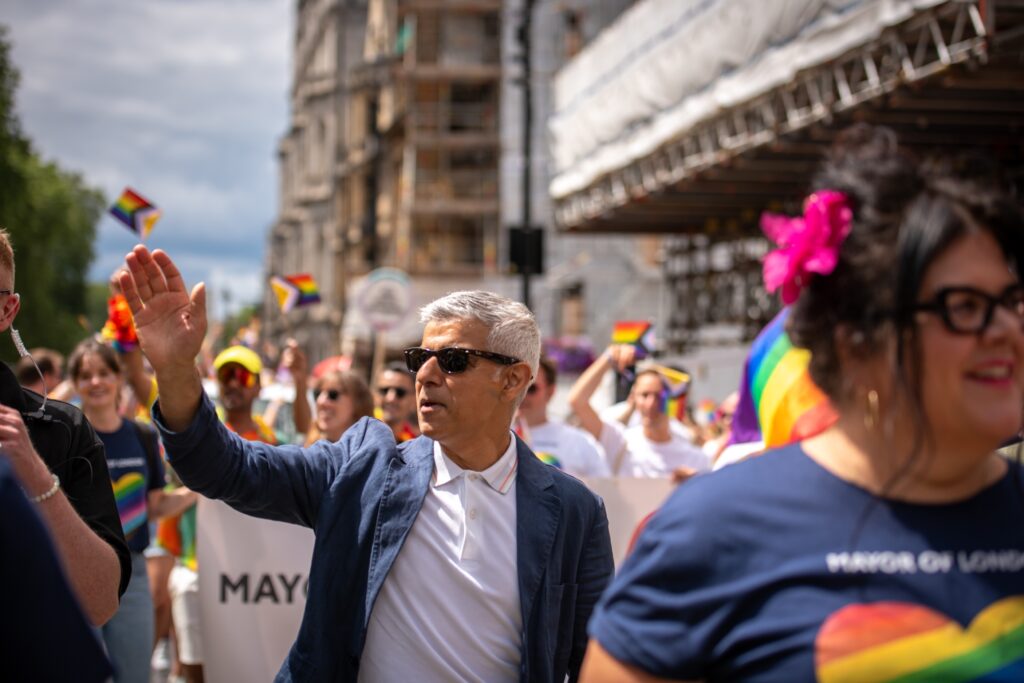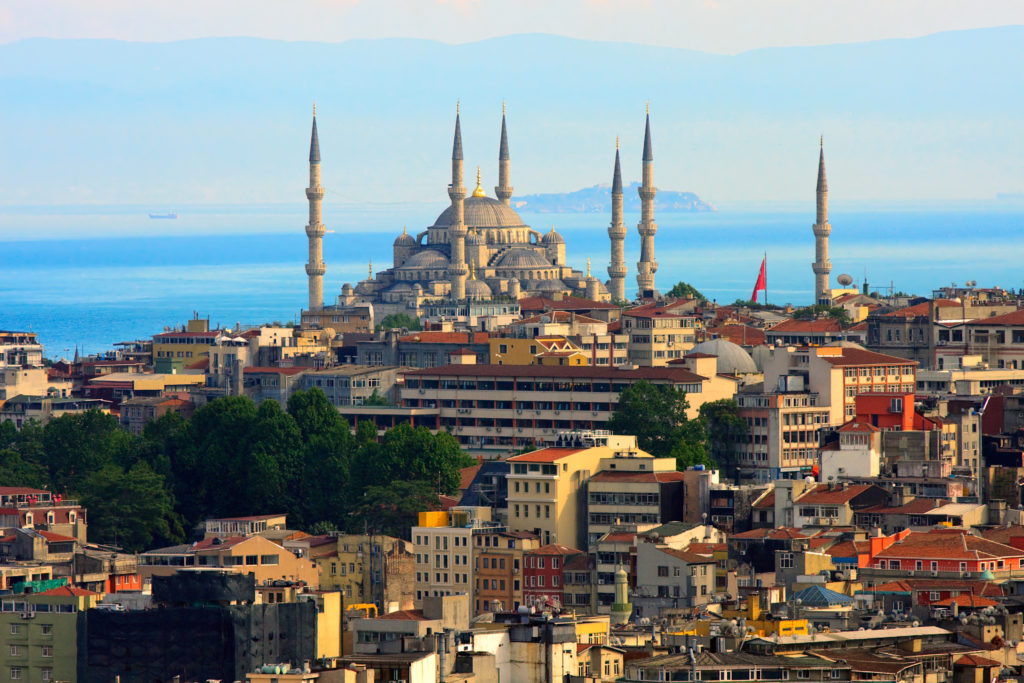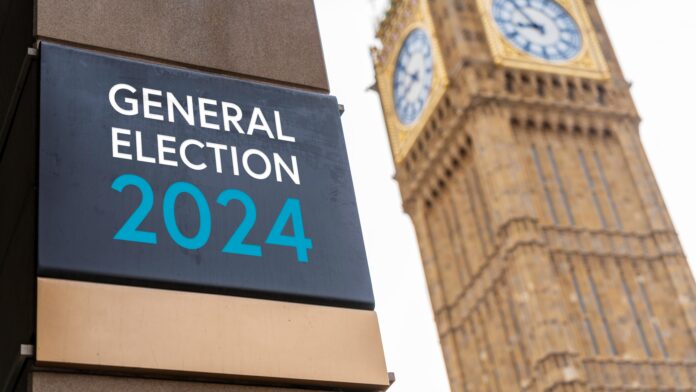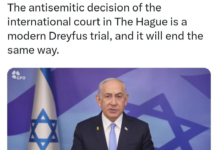Blogger Najm Al-Din says amid the mass Muslim mobilisation around the UK General Election, we shouldn’t lose sight of the big picture – that parliamentary democracy will never be the solution for our community and only an Islamic solution will suffice.
With election fever gripping the nation, Muslim minorities in the UK are riding a fresh wave of optimism ignited by the unprecedented number of independent candidates campaigning on a pro-Palestine platform.
After decades of political engagement within the confines of Establishment politics, the bi-partisan support for Israel has steered large swathes of Britain’s Muslim electorate towards a new political trajectory, where power is generated outside of mainstream parties.
Grassroots initiatives like The Muslim Vote calling for the unification of Muslim organisations and individuals against pro-Zionist factions in Westminster have garnered significant momentum, while mainstream scholars have issued fatwas declaring it a religious obligation to vote strategically in the upcoming election.
But while mobilising outside of the two-party system is commendable in that it signals a rejection of the genocide-enabling duopoly at the heart of British politics, I believe we are treading on dangerous ground by dubbing July 4th as “Independence Day.”
Democracy
Aside from the fact that British politics is in the grip of a military-corporate bureaucracy which no ordinary reform can overturn, the misconception that Islam and secular democracy are compatible systems is still widespread in the Muslim community.
Subscribe to our newsletter and stay updated on the latest news and updates from around the Muslim world!
Although independent candidates may be sincere in their advocacy for Palestine, I cannot endorse them for their anti-genocide stance alone without interrogating their political philosophy, which in my view cannot be reconciled with Islam.
Like anyone aspiring for office, independent candidates must subscribe to a system of government which is premised on some non-negotiable principles. This includes loyalty to the nation state, organised around the centre of parliamentary sovereignty, which confers parliament the powers of legislative supremacy, amounting to a usurpation of Allah’s exclusive right to sovereignty.
Even if one is mobilising outside of the traditional confines of consensus politics, accepting this pillar of constitutional law is a prerequisite for any representation, membership and stake in the system.

Despite the fact that secular governments were conceived in a historical context where religion was extricated from the governing process and perceived with scepticism, far too many Muslims have normalised engagement with a political system that sacralises the nation state and substitutes Allah for the creation as the ultimate arbiter of right and wrong.
This has corrupted the hearts and minds of millions whose politics is no longer anchored to the Islamic tradition but to Western secular ideals which exercises mastery over their thoughts and behaviours.
Having championed participation in secular democracies for decades, the cumulative efforts of Muslim activism and scholarship has spawned a generation of diaspora Muslims who are unable to envisage a ruling system other than the one imposed by their imperial overlords.
Regrettably, this has led to a conflicting duality where Muslims are torn between two sovereigns competing for their allegiance: Allah and The Parliament.
Regardless of how passionately one campaigns against Zionism, embracing the foundational values of a secular liberal polity by affirming the right of lawmaking for other than Allah transgresses against his lordship in the temporal realm, whilst aiding the neo-colonial project to secularise the Muslim world. By voting, we immediately become part of a problem we ought to resolve, professing the “religion” of Islam under the “deen” of secular democracy.
Therefore, we ignore the wider implications of involvement in secular politics at our peril. While many will vote for purely pragmatic and non-ideological reasons, we can’t ignore how it has compounded an identity crisis by conditioning generations of Muslims to subordinate Islamic political values to Western secularism.
Lessons from the past
It’s also worth remembering that in their attempt to break the glass ceiling, Muslim politicians like Sadiq Khan and Humza Yousaf – many of whom were feted by scholars -jettisoned fundamental Islamic principles through their promotion of LGBT rights, often under the banner of inclusivity and empowering minorities.
If history teaches us anything, Muslim integration in Western democracies has been fraught with danger. Those hoping it would be a net positive quickly realised that securing a place at the table was only possible by riding roughshod over Islamic principles and conditioned on the adoption of social, political and economic principles which are categorically prohibited in Islam, such as same sex marriage, parliamentary sovereignty and a riba-based capitalist economy.
Muslim independent candidates will soon learn that any perceived benefit is short term and elusive because the system in which they seek representation demands fealty to the secular liberal zeitgeist.
It begs a question: If representation in a secular political system is contrary to Islamic teachings, how can Muslims champion the cause of Palestine?
Khilafah
Instead of glossing over the reality of power dynamics in the West and pinning hopes on a plutocratic system which elevates man to a status exclusively reserved for the Creator, Muslims in the UK must channel their anti-establishment sentiments by aspiring for a system of governance which can be an effective guarantor of Islamic values.
This is possible once we acknowledge our faith-based duty to reinstate the sovereignty of Allah through the restoration of a Caliphate.
Not only did the major schools of thought stipulate that the Khilafah must be established as a matter of worship, classical jurists and political theorists went to lengths in highlighting its critical functions, which is particularly relevant in light of the situation in Palestine.
In his famous treatise Al-Ahkäm al-Sultäniyyah wa ‘l-Wiläyat al-Diniyyah, Imam Mawardi opined that the appointment of a Khalifah was an indispensable safeguard against social anarchy, preventing Muslim societies from descending into sedition.

Abu Hamid Muhammad al-Ghazzali, in Al-Iqtisad fi’il-I’tiqad argued that the function of leadership was to execute the commandments of God in all matters of statecraft, including appointing military commanders, organising the ranks of the Muslim army for battle against hostile threats and to defend the frontiers of the state from invaders.
In the absence of a Khalifah, the Muslim world is drifting aimlessly without an exponent of the divinely-inspired system vested with the duty to enforce God-ordained law and justice, maintain peace and justice in ruling territories, receive and distribute the legal alms (zakat), delegate responsibilities to competent regents, guard the faith against heterodoxy, liberate occupied Muslim land and conduct a foreign policy based on dawah and striving in the path of Allah to make his word sovereign.
In short, the legislative, executive, judicial and military authority determined by Islam and the Maqasid al Shariah (higher objectives of Islamic law) can only materialise under the auspices of a Caliphate and any authority derived from outside this framework is illegitimate from a Shari’ perspective.
Therefore, the noble aspiration to liberate Palestine and restore the sanctity of Masjid Al Aqsa can only be fulfilled once we revive the abandoned obligation to establish a Khilafah.
This will harness the political, economic and military resources of the Ummah and form a security architecture to reverse the Zionist occupation of the Holy Land and unify the region under the protection of an Islamic ruling system which will function as a single overarching political umbrella for the regions Muslim and non-Muslim citizens.
Vision
My advice to Muslims in the UK is to look beyond the farcical spectacle of national elections, which is nothing more than a painfully scripted reality TV show where tempers are tested every few years.
While the swing against Labour reflects the depth of pro-Palestinian feeling in Muslim constituencies, we can no longer be duped into half-baked solutions.
A change of tact is needed, but no headway is possible if we allow another generation to be sold on the lie that Muslims can be a positive catalyst for change by forging strategic alliances in a system which infringes against the clear-cut commandments of Allah, marginalises the role of religion to the private sphere and functions to preserve the hegemony of an unelected and unaccountable class of warmongering oligarchs.
Instead of propping up a process which instals pro Zionists and corporate brokers into power by virtue of its very design, we must force a paradigmatic shift in the Ummah’s consciousness by indulging a broader perspective on politics altogether, encouraging non-compliance with the entire secular political apparatus, based on the recognition that the only form of governance permitted in Islam is the divinely ordained Khilafah.
While Muslim majority states must serve as the loci for this project, nothing prevents Muslims in the UK from canvassing for this idea in their communities, whilst exploring the political, economic and psycho-spiritual benefits which a Khilafah can offer for non-Muslims.
Be it in masjids, dawah workshops, interfaith events or part of our social media outreach, we must utilise the various tools at our disposal to articulate this bold new vision, hoping it will reverberate far beyond these shores.
Scholars
In closing, the onus is on the traditional vanguards of Islam – the ulema – to recognise the imperative for reviving a system of governance based on what Allah revealed and eschew any ideology which is antithetical to this objective.
Rather than uniting on a Muslim bloc vote which assimilates Muslims into the secular nation-state and does nothing to dismantle the unelected bureaucracy which influences policymaking, scholars must rally the Muslim laity to repudiate the ideologies which are alien to the Islamic tradition, be it the false idols of pan-Arabism, communism, or the nation-state ideals of the secular-liberal capitalist order under which many are languishing.
Instead, let’s use this period of heightened politicisation to facilitate collaboration between our scholars and macro thinkers and communicate strategies centred around a new meta-narrative, geared towards implementing Islam inside the corridors of power in the Muslim world and overcoming the Ummah’s cultural and political fragmentation through a supranational identity which transcends narrow ethnic and sectarian boundaries.
If we want to rescue the besieged inhabitants of Gaza, Muslim scholarship must first inspire change in long-established power dynamics by initiating synergistic efforts across a range of disciplines devoted to restoring Islam as a comprehensive deen through the implementation of the Khilafah Rashida, which will help invoke a common spiritual solidarity between geographically dispersed Muslims.
Across our spheres of influence, we must plant the seeds of Caliphate consciousness and spearhead a civilisation struggle to resurrect this neglected dimension of tawheed (monotheism), thus reclaiming the political agency and nucleus for the ummah’s transnational unity which has sadly become a distant memory of a romantic past.





















